Entrepreneurship Report: Disruptive Technology in Hospitality
VerifiedAdded on 2021/05/31
|10
|2907
|151
Report
AI Summary
This report provides a comprehensive discussion on disruptive technology and its application within the Australian hospitality industry. It explores the impact of disruptive technologies, particularly focusing on robotics and AI, on hotels and hospitality businesses. The report outlines the role of disruptive technology in enhancing customer engagement and streamlining operations, while also addressing both the positive and negative implications, such as workforce changes and cost considerations. Furthermore, it delves into future trends, including human-robot interaction, infrared sensors, and the evolving landscape of hotel automation. The analysis covers the impact of these technologies on various aspects, including customer satisfaction, operational efficiency, and security. The report concludes by highlighting the importance of adapting to technological advancements to maintain a competitive edge in the dynamic hospitality sector.
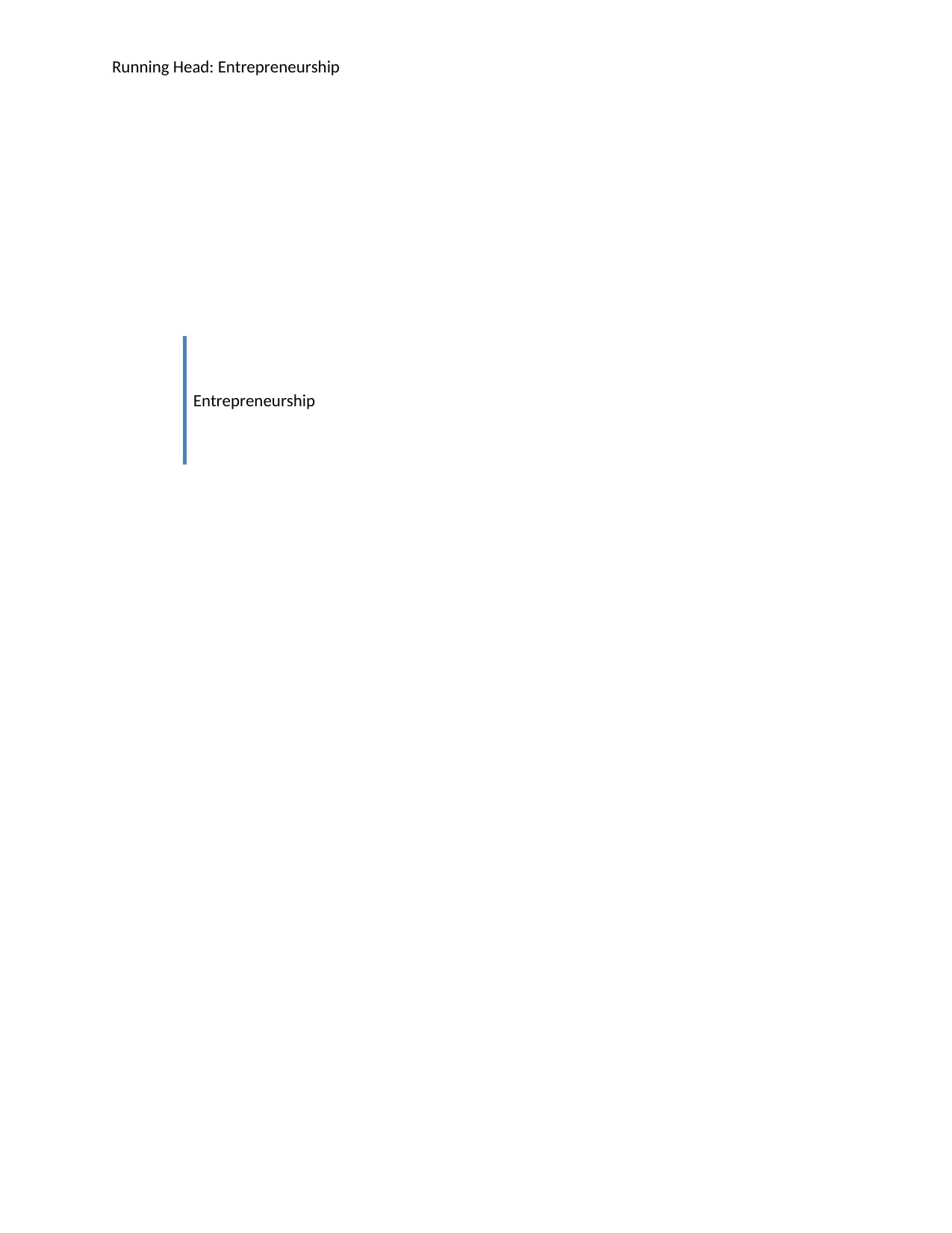
Running Head: Entrepreneurship
Entrepreneurship
Entrepreneurship
Paraphrase This Document
Need a fresh take? Get an instant paraphrase of this document with our AI Paraphraser
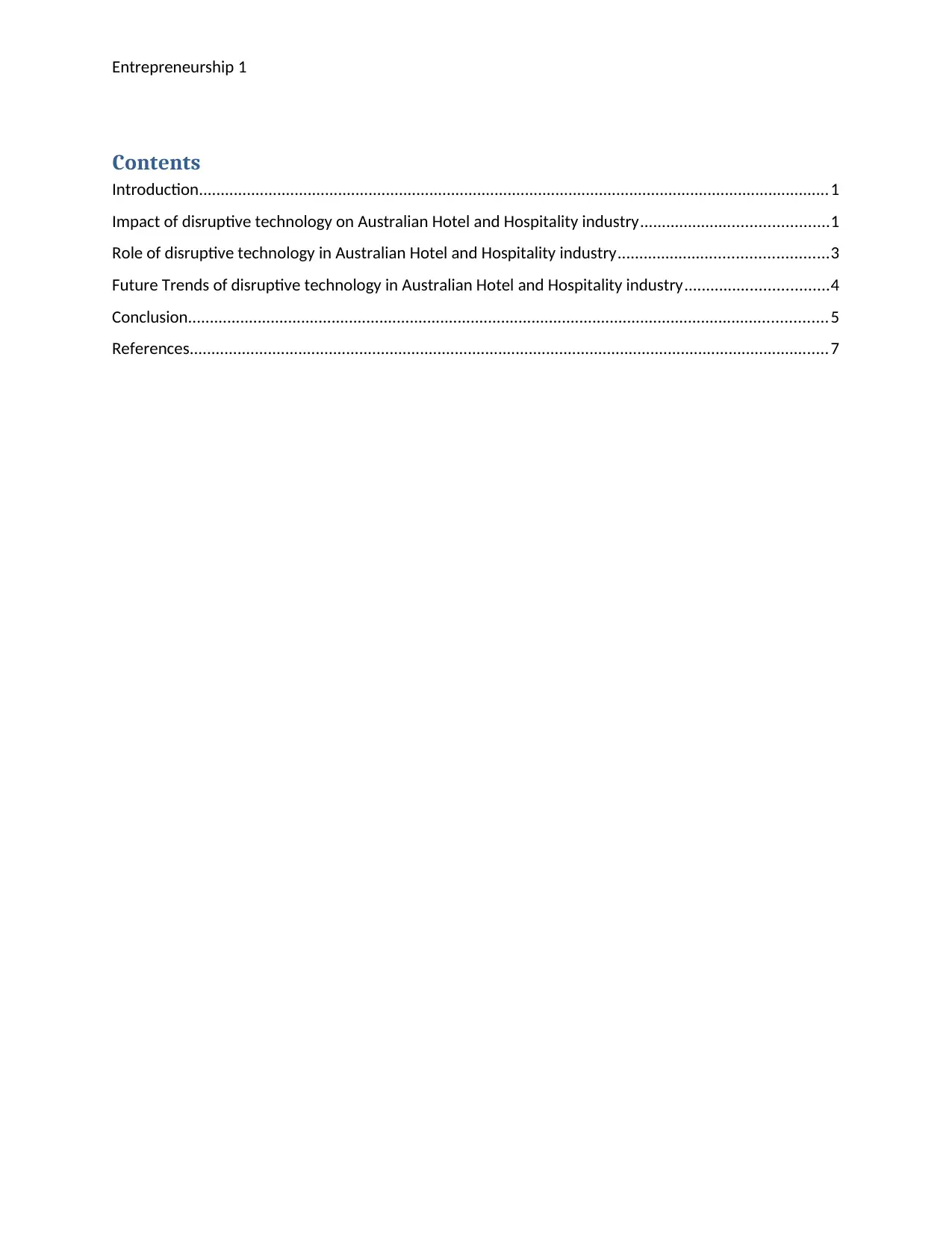
Entrepreneurship 1
Contents
Introduction.................................................................................................................................................1
Impact of disruptive technology on Australian Hotel and Hospitality industry...........................................1
Role of disruptive technology in Australian Hotel and Hospitality industry................................................3
Future Trends of disruptive technology in Australian Hotel and Hospitality industry.................................4
Conclusion...................................................................................................................................................5
References...................................................................................................................................................7
Contents
Introduction.................................................................................................................................................1
Impact of disruptive technology on Australian Hotel and Hospitality industry...........................................1
Role of disruptive technology in Australian Hotel and Hospitality industry................................................3
Future Trends of disruptive technology in Australian Hotel and Hospitality industry.................................4
Conclusion...................................................................................................................................................5
References...................................................................................................................................................7
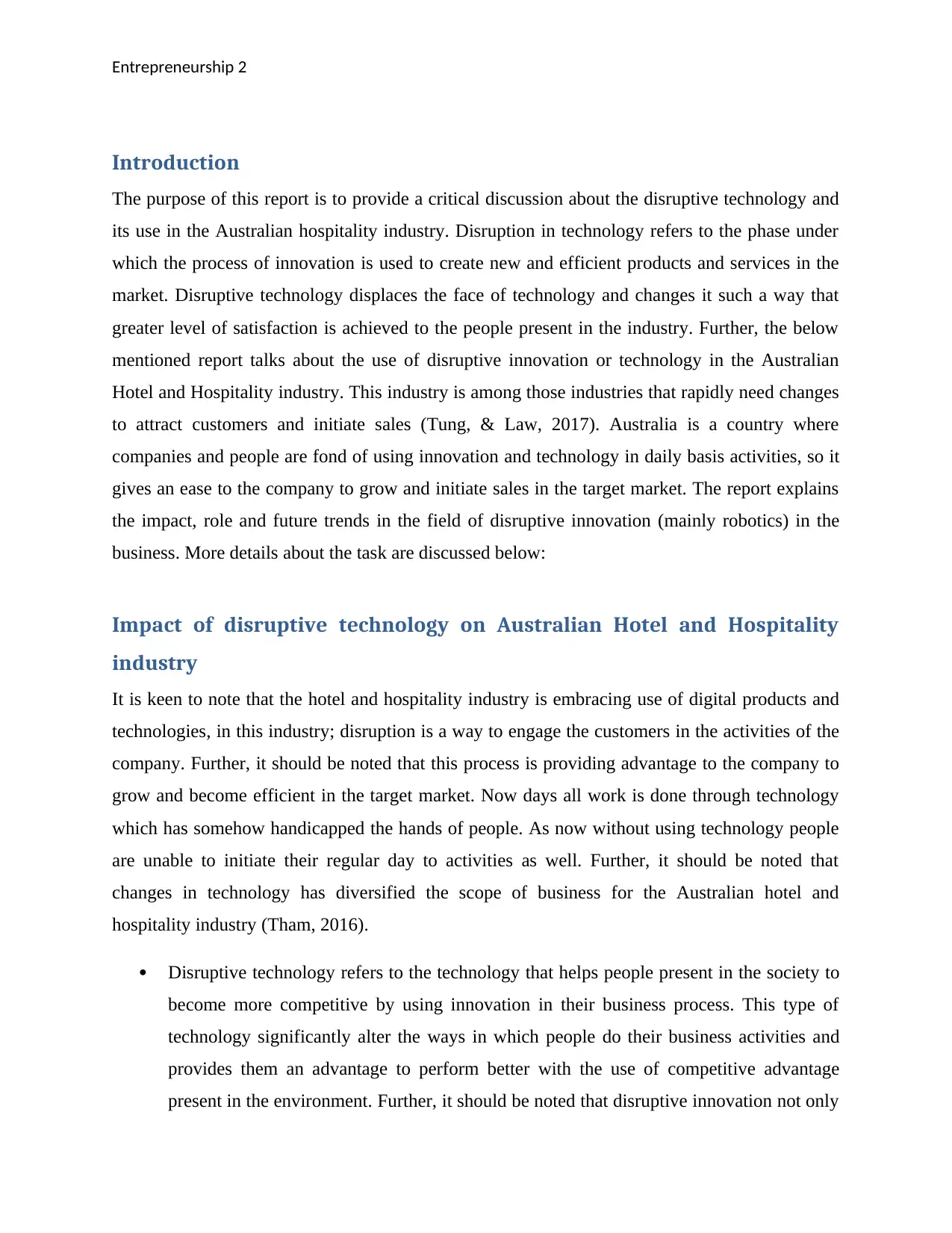
Entrepreneurship 2
Introduction
The purpose of this report is to provide a critical discussion about the disruptive technology and
its use in the Australian hospitality industry. Disruption in technology refers to the phase under
which the process of innovation is used to create new and efficient products and services in the
market. Disruptive technology displaces the face of technology and changes it such a way that
greater level of satisfaction is achieved to the people present in the industry. Further, the below
mentioned report talks about the use of disruptive innovation or technology in the Australian
Hotel and Hospitality industry. This industry is among those industries that rapidly need changes
to attract customers and initiate sales (Tung, & Law, 2017). Australia is a country where
companies and people are fond of using innovation and technology in daily basis activities, so it
gives an ease to the company to grow and initiate sales in the target market. The report explains
the impact, role and future trends in the field of disruptive innovation (mainly robotics) in the
business. More details about the task are discussed below:
Impact of disruptive technology on Australian Hotel and Hospitality
industry
It is keen to note that the hotel and hospitality industry is embracing use of digital products and
technologies, in this industry; disruption is a way to engage the customers in the activities of the
company. Further, it should be noted that this process is providing advantage to the company to
grow and become efficient in the target market. Now days all work is done through technology
which has somehow handicapped the hands of people. As now without using technology people
are unable to initiate their regular day to activities as well. Further, it should be noted that
changes in technology has diversified the scope of business for the Australian hotel and
hospitality industry (Tham, 2016).
Disruptive technology refers to the technology that helps people present in the society to
become more competitive by using innovation in their business process. This type of
technology significantly alter the ways in which people do their business activities and
provides them an advantage to perform better with the use of competitive advantage
present in the environment. Further, it should be noted that disruptive innovation not only
Introduction
The purpose of this report is to provide a critical discussion about the disruptive technology and
its use in the Australian hospitality industry. Disruption in technology refers to the phase under
which the process of innovation is used to create new and efficient products and services in the
market. Disruptive technology displaces the face of technology and changes it such a way that
greater level of satisfaction is achieved to the people present in the industry. Further, the below
mentioned report talks about the use of disruptive innovation or technology in the Australian
Hotel and Hospitality industry. This industry is among those industries that rapidly need changes
to attract customers and initiate sales (Tung, & Law, 2017). Australia is a country where
companies and people are fond of using innovation and technology in daily basis activities, so it
gives an ease to the company to grow and initiate sales in the target market. The report explains
the impact, role and future trends in the field of disruptive innovation (mainly robotics) in the
business. More details about the task are discussed below:
Impact of disruptive technology on Australian Hotel and Hospitality
industry
It is keen to note that the hotel and hospitality industry is embracing use of digital products and
technologies, in this industry; disruption is a way to engage the customers in the activities of the
company. Further, it should be noted that this process is providing advantage to the company to
grow and become efficient in the target market. Now days all work is done through technology
which has somehow handicapped the hands of people. As now without using technology people
are unable to initiate their regular day to activities as well. Further, it should be noted that
changes in technology has diversified the scope of business for the Australian hotel and
hospitality industry (Tham, 2016).
Disruptive technology refers to the technology that helps people present in the society to
become more competitive by using innovation in their business process. This type of
technology significantly alter the ways in which people do their business activities and
provides them an advantage to perform better with the use of competitive advantage
present in the environment. Further, it should be noted that disruptive innovation not only
⊘ This is a preview!⊘
Do you want full access?
Subscribe today to unlock all pages.

Trusted by 1+ million students worldwide
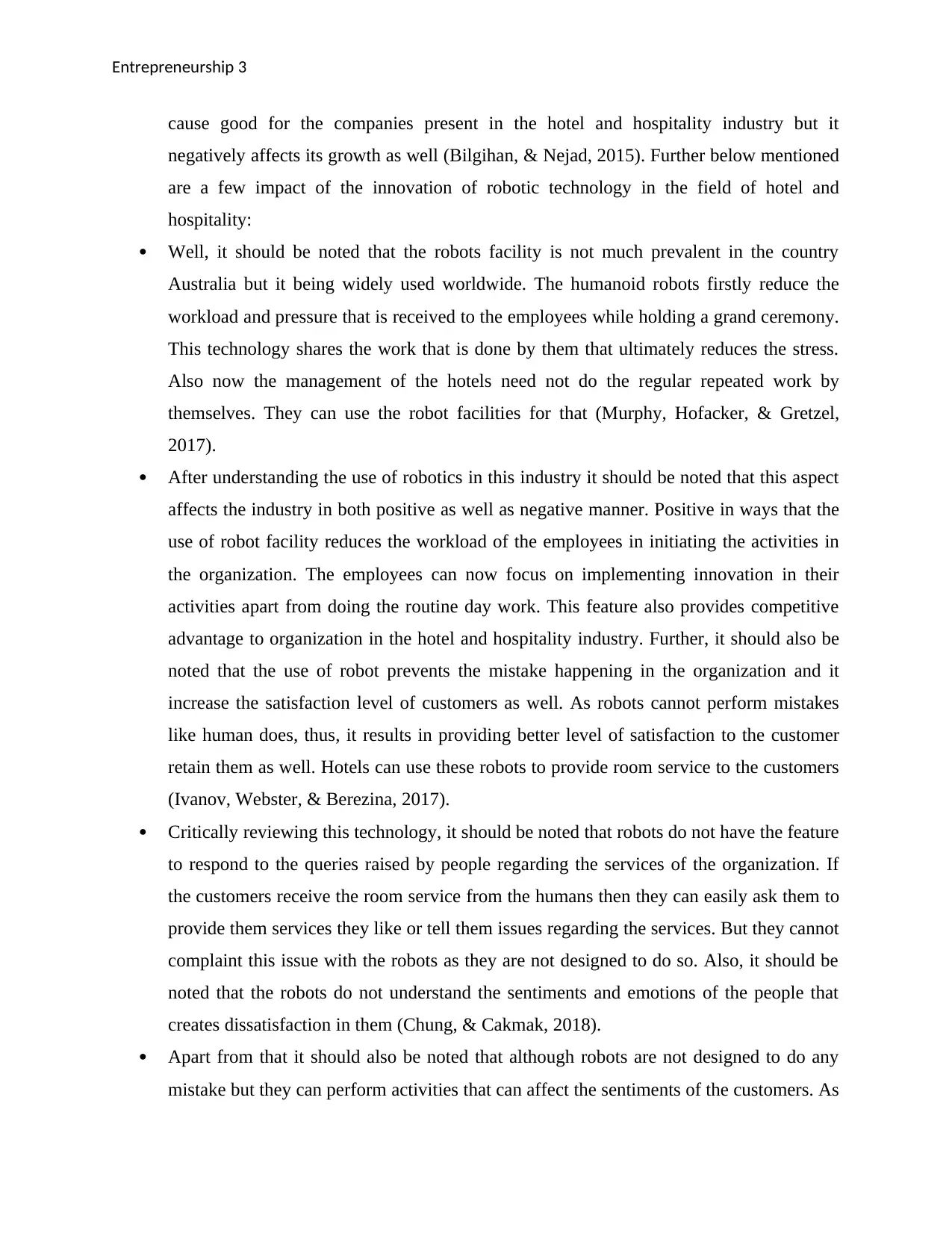
Entrepreneurship 3
cause good for the companies present in the hotel and hospitality industry but it
negatively affects its growth as well (Bilgihan, & Nejad, 2015). Further below mentioned
are a few impact of the innovation of robotic technology in the field of hotel and
hospitality:
Well, it should be noted that the robots facility is not much prevalent in the country
Australia but it being widely used worldwide. The humanoid robots firstly reduce the
workload and pressure that is received to the employees while holding a grand ceremony.
This technology shares the work that is done by them that ultimately reduces the stress.
Also now the management of the hotels need not do the regular repeated work by
themselves. They can use the robot facilities for that (Murphy, Hofacker, & Gretzel,
2017).
After understanding the use of robotics in this industry it should be noted that this aspect
affects the industry in both positive as well as negative manner. Positive in ways that the
use of robot facility reduces the workload of the employees in initiating the activities in
the organization. The employees can now focus on implementing innovation in their
activities apart from doing the routine day work. This feature also provides competitive
advantage to organization in the hotel and hospitality industry. Further, it should also be
noted that the use of robot prevents the mistake happening in the organization and it
increase the satisfaction level of customers as well. As robots cannot perform mistakes
like human does, thus, it results in providing better level of satisfaction to the customer
retain them as well. Hotels can use these robots to provide room service to the customers
(Ivanov, Webster, & Berezina, 2017).
Critically reviewing this technology, it should be noted that robots do not have the feature
to respond to the queries raised by people regarding the services of the organization. If
the customers receive the room service from the humans then they can easily ask them to
provide them services they like or tell them issues regarding the services. But they cannot
complaint this issue with the robots as they are not designed to do so. Also, it should be
noted that the robots do not understand the sentiments and emotions of the people that
creates dissatisfaction in them (Chung, & Cakmak, 2018).
Apart from that it should also be noted that although robots are not designed to do any
mistake but they can perform activities that can affect the sentiments of the customers. As
cause good for the companies present in the hotel and hospitality industry but it
negatively affects its growth as well (Bilgihan, & Nejad, 2015). Further below mentioned
are a few impact of the innovation of robotic technology in the field of hotel and
hospitality:
Well, it should be noted that the robots facility is not much prevalent in the country
Australia but it being widely used worldwide. The humanoid robots firstly reduce the
workload and pressure that is received to the employees while holding a grand ceremony.
This technology shares the work that is done by them that ultimately reduces the stress.
Also now the management of the hotels need not do the regular repeated work by
themselves. They can use the robot facilities for that (Murphy, Hofacker, & Gretzel,
2017).
After understanding the use of robotics in this industry it should be noted that this aspect
affects the industry in both positive as well as negative manner. Positive in ways that the
use of robot facility reduces the workload of the employees in initiating the activities in
the organization. The employees can now focus on implementing innovation in their
activities apart from doing the routine day work. This feature also provides competitive
advantage to organization in the hotel and hospitality industry. Further, it should also be
noted that the use of robot prevents the mistake happening in the organization and it
increase the satisfaction level of customers as well. As robots cannot perform mistakes
like human does, thus, it results in providing better level of satisfaction to the customer
retain them as well. Hotels can use these robots to provide room service to the customers
(Ivanov, Webster, & Berezina, 2017).
Critically reviewing this technology, it should be noted that robots do not have the feature
to respond to the queries raised by people regarding the services of the organization. If
the customers receive the room service from the humans then they can easily ask them to
provide them services they like or tell them issues regarding the services. But they cannot
complaint this issue with the robots as they are not designed to do so. Also, it should be
noted that the robots do not understand the sentiments and emotions of the people that
creates dissatisfaction in them (Chung, & Cakmak, 2018).
Apart from that it should also be noted that although robots are not designed to do any
mistake but they can perform activities that can affect the sentiments of the customers. As
Paraphrase This Document
Need a fresh take? Get an instant paraphrase of this document with our AI Paraphraser
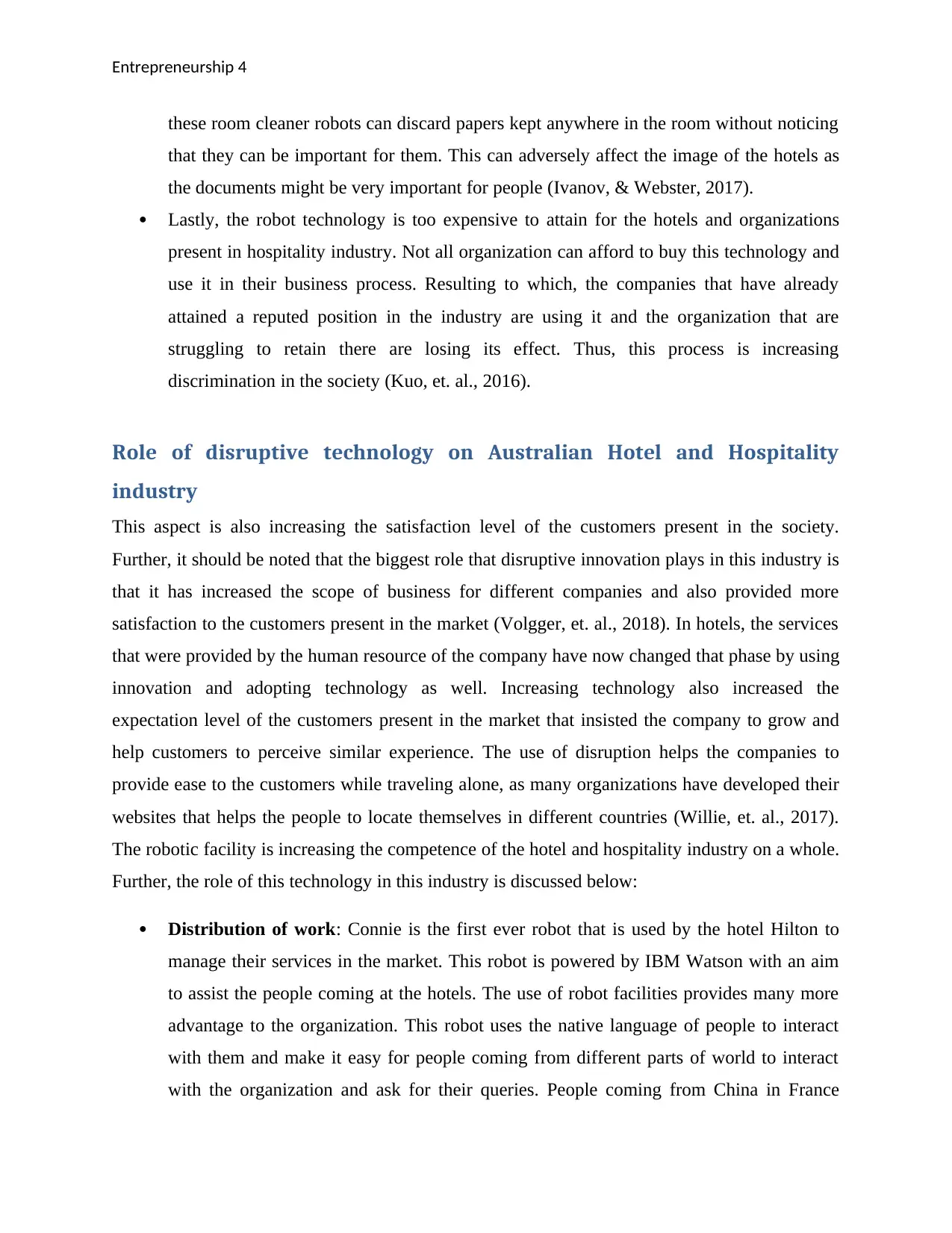
Entrepreneurship 4
these room cleaner robots can discard papers kept anywhere in the room without noticing
that they can be important for them. This can adversely affect the image of the hotels as
the documents might be very important for people (Ivanov, & Webster, 2017).
Lastly, the robot technology is too expensive to attain for the hotels and organizations
present in hospitality industry. Not all organization can afford to buy this technology and
use it in their business process. Resulting to which, the companies that have already
attained a reputed position in the industry are using it and the organization that are
struggling to retain there are losing its effect. Thus, this process is increasing
discrimination in the society (Kuo, et. al., 2016).
Role of disruptive technology on Australian Hotel and Hospitality
industry
This aspect is also increasing the satisfaction level of the customers present in the society.
Further, it should be noted that the biggest role that disruptive innovation plays in this industry is
that it has increased the scope of business for different companies and also provided more
satisfaction to the customers present in the market (Volgger, et. al., 2018). In hotels, the services
that were provided by the human resource of the company have now changed that phase by using
innovation and adopting technology as well. Increasing technology also increased the
expectation level of the customers present in the market that insisted the company to grow and
help customers to perceive similar experience. The use of disruption helps the companies to
provide ease to the customers while traveling alone, as many organizations have developed their
websites that helps the people to locate themselves in different countries (Willie, et. al., 2017).
The robotic facility is increasing the competence of the hotel and hospitality industry on a whole.
Further, the role of this technology in this industry is discussed below:
Distribution of work: Connie is the first ever robot that is used by the hotel Hilton to
manage their services in the market. This robot is powered by IBM Watson with an aim
to assist the people coming at the hotels. The use of robot facilities provides many more
advantage to the organization. This robot uses the native language of people to interact
with them and make it easy for people coming from different parts of world to interact
with the organization and ask for their queries. People coming from China in France
these room cleaner robots can discard papers kept anywhere in the room without noticing
that they can be important for them. This can adversely affect the image of the hotels as
the documents might be very important for people (Ivanov, & Webster, 2017).
Lastly, the robot technology is too expensive to attain for the hotels and organizations
present in hospitality industry. Not all organization can afford to buy this technology and
use it in their business process. Resulting to which, the companies that have already
attained a reputed position in the industry are using it and the organization that are
struggling to retain there are losing its effect. Thus, this process is increasing
discrimination in the society (Kuo, et. al., 2016).
Role of disruptive technology on Australian Hotel and Hospitality
industry
This aspect is also increasing the satisfaction level of the customers present in the society.
Further, it should be noted that the biggest role that disruptive innovation plays in this industry is
that it has increased the scope of business for different companies and also provided more
satisfaction to the customers present in the market (Volgger, et. al., 2018). In hotels, the services
that were provided by the human resource of the company have now changed that phase by using
innovation and adopting technology as well. Increasing technology also increased the
expectation level of the customers present in the market that insisted the company to grow and
help customers to perceive similar experience. The use of disruption helps the companies to
provide ease to the customers while traveling alone, as many organizations have developed their
websites that helps the people to locate themselves in different countries (Willie, et. al., 2017).
The robotic facility is increasing the competence of the hotel and hospitality industry on a whole.
Further, the role of this technology in this industry is discussed below:
Distribution of work: Connie is the first ever robot that is used by the hotel Hilton to
manage their services in the market. This robot is powered by IBM Watson with an aim
to assist the people coming at the hotels. The use of robot facilities provides many more
advantage to the organization. This robot uses the native language of people to interact
with them and make it easy for people coming from different parts of world to interact
with the organization and ask for their queries. People coming from China in France
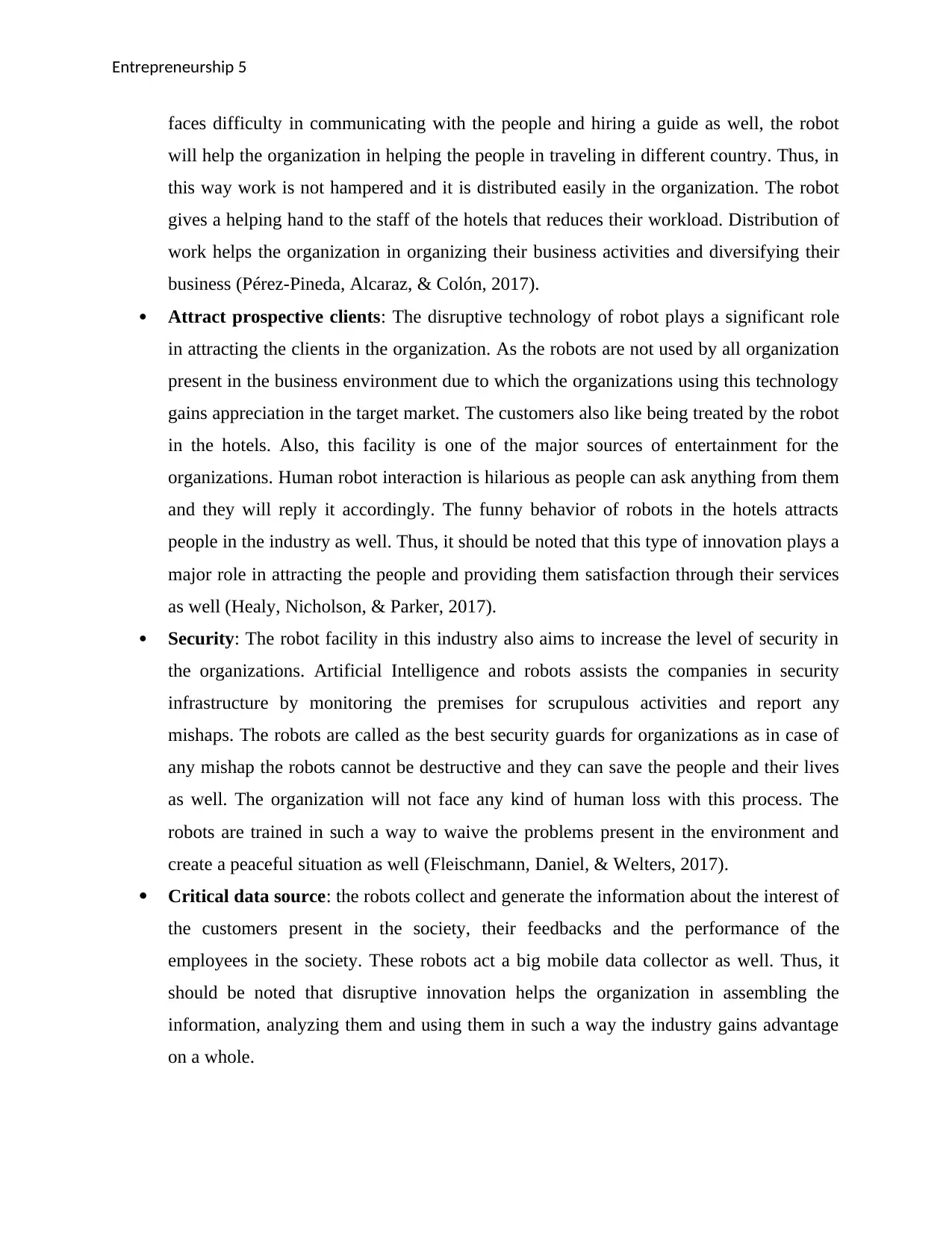
Entrepreneurship 5
faces difficulty in communicating with the people and hiring a guide as well, the robot
will help the organization in helping the people in traveling in different country. Thus, in
this way work is not hampered and it is distributed easily in the organization. The robot
gives a helping hand to the staff of the hotels that reduces their workload. Distribution of
work helps the organization in organizing their business activities and diversifying their
business (Pérez-Pineda, Alcaraz, & Colón, 2017).
Attract prospective clients: The disruptive technology of robot plays a significant role
in attracting the clients in the organization. As the robots are not used by all organization
present in the business environment due to which the organizations using this technology
gains appreciation in the target market. The customers also like being treated by the robot
in the hotels. Also, this facility is one of the major sources of entertainment for the
organizations. Human robot interaction is hilarious as people can ask anything from them
and they will reply it accordingly. The funny behavior of robots in the hotels attracts
people in the industry as well. Thus, it should be noted that this type of innovation plays a
major role in attracting the people and providing them satisfaction through their services
as well (Healy, Nicholson, & Parker, 2017).
Security: The robot facility in this industry also aims to increase the level of security in
the organizations. Artificial Intelligence and robots assists the companies in security
infrastructure by monitoring the premises for scrupulous activities and report any
mishaps. The robots are called as the best security guards for organizations as in case of
any mishap the robots cannot be destructive and they can save the people and their lives
as well. The organization will not face any kind of human loss with this process. The
robots are trained in such a way to waive the problems present in the environment and
create a peaceful situation as well (Fleischmann, Daniel, & Welters, 2017).
Critical data source: the robots collect and generate the information about the interest of
the customers present in the society, their feedbacks and the performance of the
employees in the society. These robots act a big mobile data collector as well. Thus, it
should be noted that disruptive innovation helps the organization in assembling the
information, analyzing them and using them in such a way the industry gains advantage
on a whole.
faces difficulty in communicating with the people and hiring a guide as well, the robot
will help the organization in helping the people in traveling in different country. Thus, in
this way work is not hampered and it is distributed easily in the organization. The robot
gives a helping hand to the staff of the hotels that reduces their workload. Distribution of
work helps the organization in organizing their business activities and diversifying their
business (Pérez-Pineda, Alcaraz, & Colón, 2017).
Attract prospective clients: The disruptive technology of robot plays a significant role
in attracting the clients in the organization. As the robots are not used by all organization
present in the business environment due to which the organizations using this technology
gains appreciation in the target market. The customers also like being treated by the robot
in the hotels. Also, this facility is one of the major sources of entertainment for the
organizations. Human robot interaction is hilarious as people can ask anything from them
and they will reply it accordingly. The funny behavior of robots in the hotels attracts
people in the industry as well. Thus, it should be noted that this type of innovation plays a
major role in attracting the people and providing them satisfaction through their services
as well (Healy, Nicholson, & Parker, 2017).
Security: The robot facility in this industry also aims to increase the level of security in
the organizations. Artificial Intelligence and robots assists the companies in security
infrastructure by monitoring the premises for scrupulous activities and report any
mishaps. The robots are called as the best security guards for organizations as in case of
any mishap the robots cannot be destructive and they can save the people and their lives
as well. The organization will not face any kind of human loss with this process. The
robots are trained in such a way to waive the problems present in the environment and
create a peaceful situation as well (Fleischmann, Daniel, & Welters, 2017).
Critical data source: the robots collect and generate the information about the interest of
the customers present in the society, their feedbacks and the performance of the
employees in the society. These robots act a big mobile data collector as well. Thus, it
should be noted that disruptive innovation helps the organization in assembling the
information, analyzing them and using them in such a way the industry gains advantage
on a whole.
⊘ This is a preview!⊘
Do you want full access?
Subscribe today to unlock all pages.

Trusted by 1+ million students worldwide
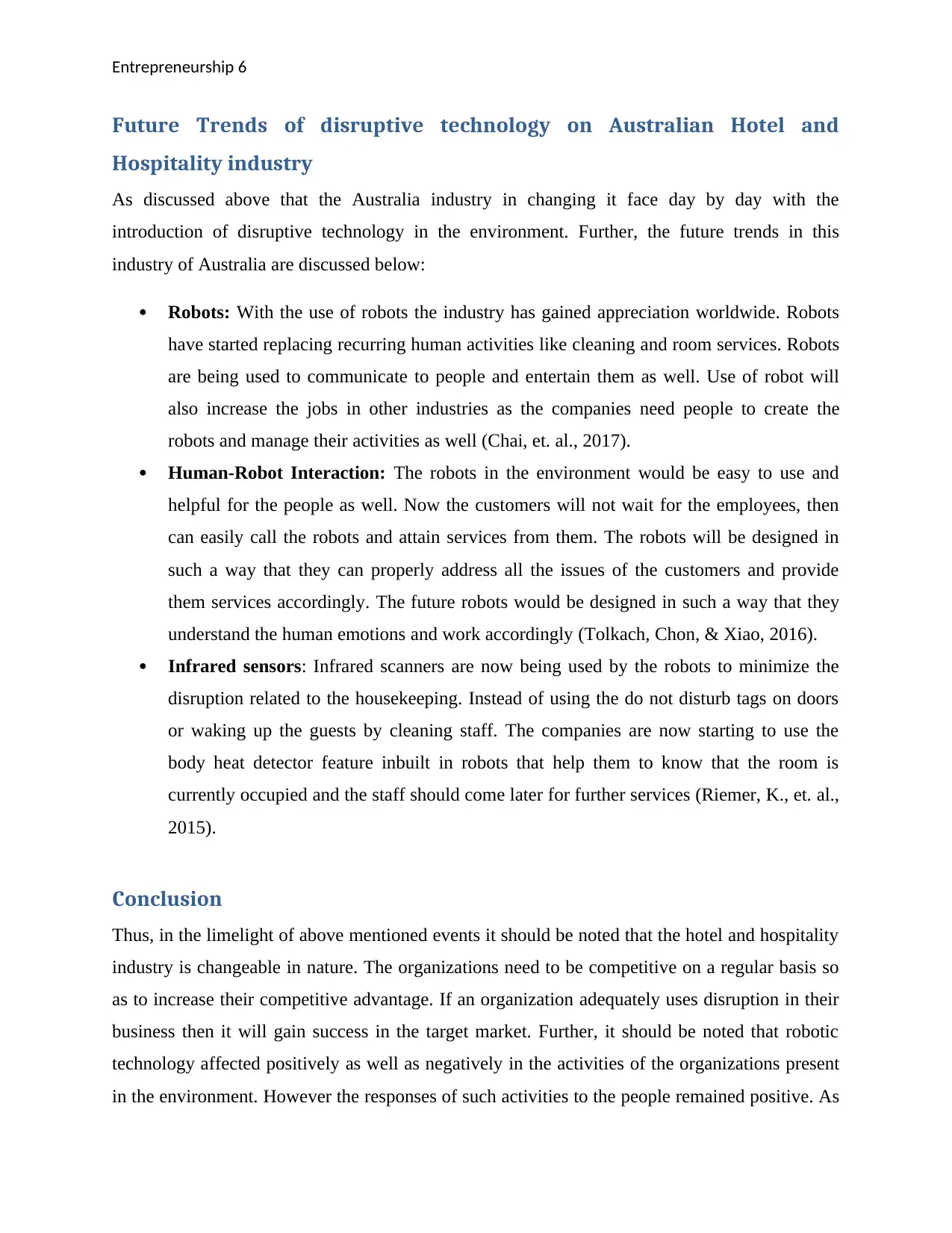
Entrepreneurship 6
Future Trends of disruptive technology on Australian Hotel and
Hospitality industry
As discussed above that the Australia industry in changing it face day by day with the
introduction of disruptive technology in the environment. Further, the future trends in this
industry of Australia are discussed below:
Robots: With the use of robots the industry has gained appreciation worldwide. Robots
have started replacing recurring human activities like cleaning and room services. Robots
are being used to communicate to people and entertain them as well. Use of robot will
also increase the jobs in other industries as the companies need people to create the
robots and manage their activities as well (Chai, et. al., 2017).
Human-Robot Interaction: The robots in the environment would be easy to use and
helpful for the people as well. Now the customers will not wait for the employees, then
can easily call the robots and attain services from them. The robots will be designed in
such a way that they can properly address all the issues of the customers and provide
them services accordingly. The future robots would be designed in such a way that they
understand the human emotions and work accordingly (Tolkach, Chon, & Xiao, 2016).
Infrared sensors: Infrared scanners are now being used by the robots to minimize the
disruption related to the housekeeping. Instead of using the do not disturb tags on doors
or waking up the guests by cleaning staff. The companies are now starting to use the
body heat detector feature inbuilt in robots that help them to know that the room is
currently occupied and the staff should come later for further services (Riemer, K., et. al.,
2015).
Conclusion
Thus, in the limelight of above mentioned events it should be noted that the hotel and hospitality
industry is changeable in nature. The organizations need to be competitive on a regular basis so
as to increase their competitive advantage. If an organization adequately uses disruption in their
business then it will gain success in the target market. Further, it should be noted that robotic
technology affected positively as well as negatively in the activities of the organizations present
in the environment. However the responses of such activities to the people remained positive. As
Future Trends of disruptive technology on Australian Hotel and
Hospitality industry
As discussed above that the Australia industry in changing it face day by day with the
introduction of disruptive technology in the environment. Further, the future trends in this
industry of Australia are discussed below:
Robots: With the use of robots the industry has gained appreciation worldwide. Robots
have started replacing recurring human activities like cleaning and room services. Robots
are being used to communicate to people and entertain them as well. Use of robot will
also increase the jobs in other industries as the companies need people to create the
robots and manage their activities as well (Chai, et. al., 2017).
Human-Robot Interaction: The robots in the environment would be easy to use and
helpful for the people as well. Now the customers will not wait for the employees, then
can easily call the robots and attain services from them. The robots will be designed in
such a way that they can properly address all the issues of the customers and provide
them services accordingly. The future robots would be designed in such a way that they
understand the human emotions and work accordingly (Tolkach, Chon, & Xiao, 2016).
Infrared sensors: Infrared scanners are now being used by the robots to minimize the
disruption related to the housekeeping. Instead of using the do not disturb tags on doors
or waking up the guests by cleaning staff. The companies are now starting to use the
body heat detector feature inbuilt in robots that help them to know that the room is
currently occupied and the staff should come later for further services (Riemer, K., et. al.,
2015).
Conclusion
Thus, in the limelight of above mentioned events it should be noted that the hotel and hospitality
industry is changeable in nature. The organizations need to be competitive on a regular basis so
as to increase their competitive advantage. If an organization adequately uses disruption in their
business then it will gain success in the target market. Further, it should be noted that robotic
technology affected positively as well as negatively in the activities of the organizations present
in the environment. However the responses of such activities to the people remained positive. As
Paraphrase This Document
Need a fresh take? Get an instant paraphrase of this document with our AI Paraphraser
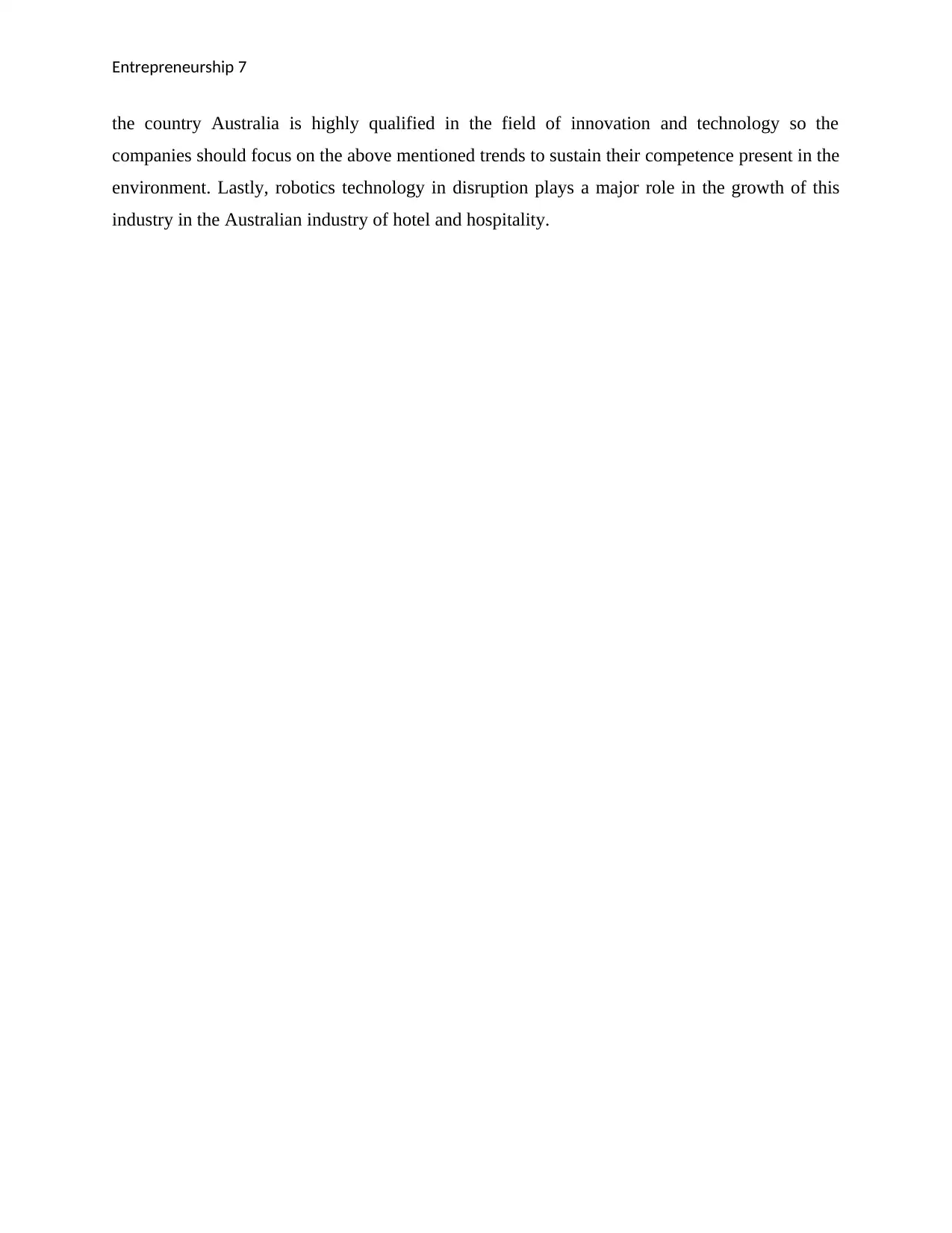
Entrepreneurship 7
the country Australia is highly qualified in the field of innovation and technology so the
companies should focus on the above mentioned trends to sustain their competence present in the
environment. Lastly, robotics technology in disruption plays a major role in the growth of this
industry in the Australian industry of hotel and hospitality.
the country Australia is highly qualified in the field of innovation and technology so the
companies should focus on the above mentioned trends to sustain their competence present in the
environment. Lastly, robotics technology in disruption plays a major role in the growth of this
industry in the Australian industry of hotel and hospitality.
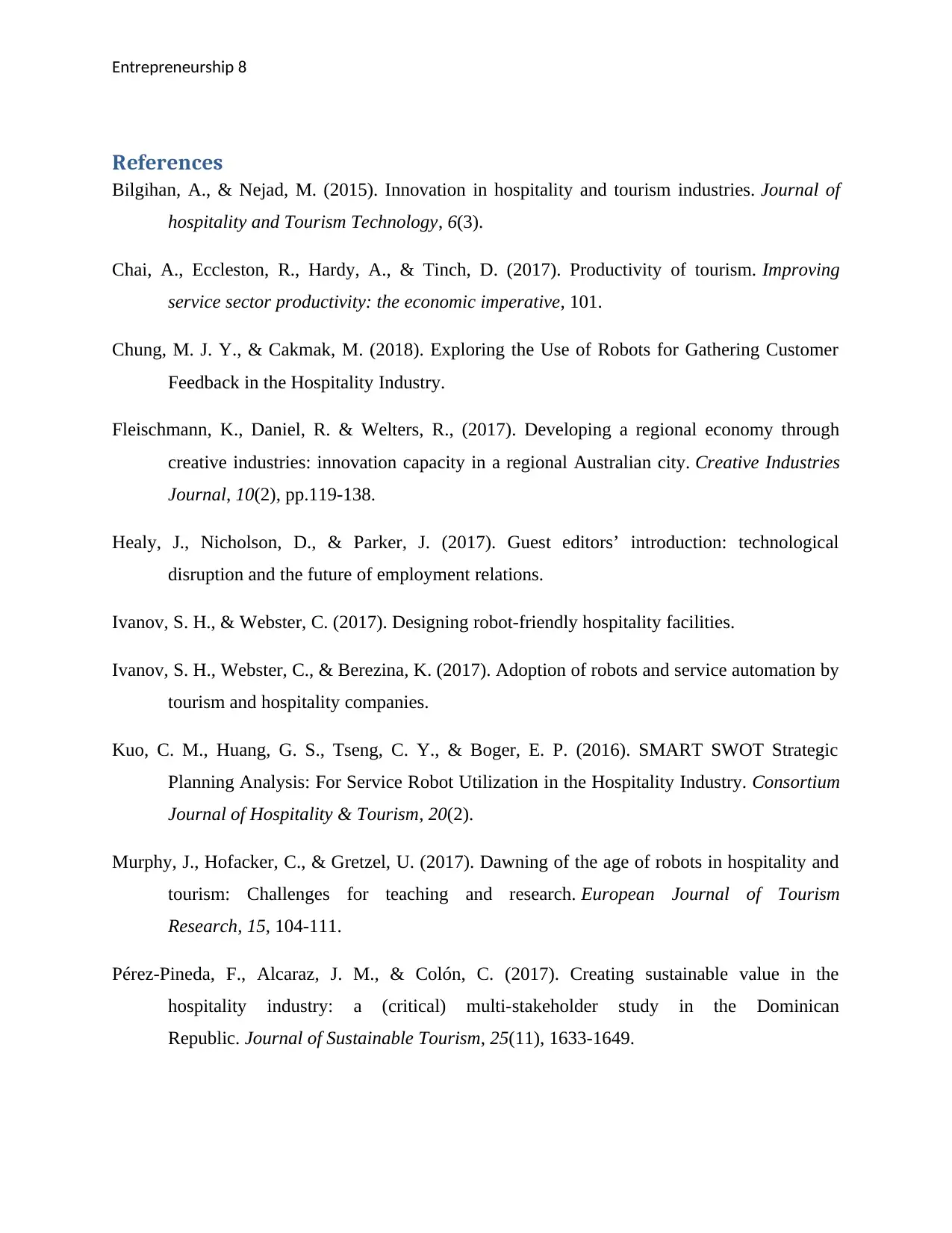
Entrepreneurship 8
References
Bilgihan, A., & Nejad, M. (2015). Innovation in hospitality and tourism industries. Journal of
hospitality and Tourism Technology, 6(3).
Chai, A., Eccleston, R., Hardy, A., & Tinch, D. (2017). Productivity of tourism. Improving
service sector productivity: the economic imperative, 101.
Chung, M. J. Y., & Cakmak, M. (2018). Exploring the Use of Robots for Gathering Customer
Feedback in the Hospitality Industry.
Fleischmann, K., Daniel, R. & Welters, R., (2017). Developing a regional economy through
creative industries: innovation capacity in a regional Australian city. Creative Industries
Journal, 10(2), pp.119-138.
Healy, J., Nicholson, D., & Parker, J. (2017). Guest editors’ introduction: technological
disruption and the future of employment relations.
Ivanov, S. H., & Webster, C. (2017). Designing robot-friendly hospitality facilities.
Ivanov, S. H., Webster, C., & Berezina, K. (2017). Adoption of robots and service automation by
tourism and hospitality companies.
Kuo, C. M., Huang, G. S., Tseng, C. Y., & Boger, E. P. (2016). SMART SWOT Strategic
Planning Analysis: For Service Robot Utilization in the Hospitality Industry. Consortium
Journal of Hospitality & Tourism, 20(2).
Murphy, J., Hofacker, C., & Gretzel, U. (2017). Dawning of the age of robots in hospitality and
tourism: Challenges for teaching and research. European Journal of Tourism
Research, 15, 104-111.
Pérez-Pineda, F., Alcaraz, J. M., & Colón, C. (2017). Creating sustainable value in the
hospitality industry: a (critical) multi-stakeholder study in the Dominican
Republic. Journal of Sustainable Tourism, 25(11), 1633-1649.
References
Bilgihan, A., & Nejad, M. (2015). Innovation in hospitality and tourism industries. Journal of
hospitality and Tourism Technology, 6(3).
Chai, A., Eccleston, R., Hardy, A., & Tinch, D. (2017). Productivity of tourism. Improving
service sector productivity: the economic imperative, 101.
Chung, M. J. Y., & Cakmak, M. (2018). Exploring the Use of Robots for Gathering Customer
Feedback in the Hospitality Industry.
Fleischmann, K., Daniel, R. & Welters, R., (2017). Developing a regional economy through
creative industries: innovation capacity in a regional Australian city. Creative Industries
Journal, 10(2), pp.119-138.
Healy, J., Nicholson, D., & Parker, J. (2017). Guest editors’ introduction: technological
disruption and the future of employment relations.
Ivanov, S. H., & Webster, C. (2017). Designing robot-friendly hospitality facilities.
Ivanov, S. H., Webster, C., & Berezina, K. (2017). Adoption of robots and service automation by
tourism and hospitality companies.
Kuo, C. M., Huang, G. S., Tseng, C. Y., & Boger, E. P. (2016). SMART SWOT Strategic
Planning Analysis: For Service Robot Utilization in the Hospitality Industry. Consortium
Journal of Hospitality & Tourism, 20(2).
Murphy, J., Hofacker, C., & Gretzel, U. (2017). Dawning of the age of robots in hospitality and
tourism: Challenges for teaching and research. European Journal of Tourism
Research, 15, 104-111.
Pérez-Pineda, F., Alcaraz, J. M., & Colón, C. (2017). Creating sustainable value in the
hospitality industry: a (critical) multi-stakeholder study in the Dominican
Republic. Journal of Sustainable Tourism, 25(11), 1633-1649.
⊘ This is a preview!⊘
Do you want full access?
Subscribe today to unlock all pages.

Trusted by 1+ million students worldwide
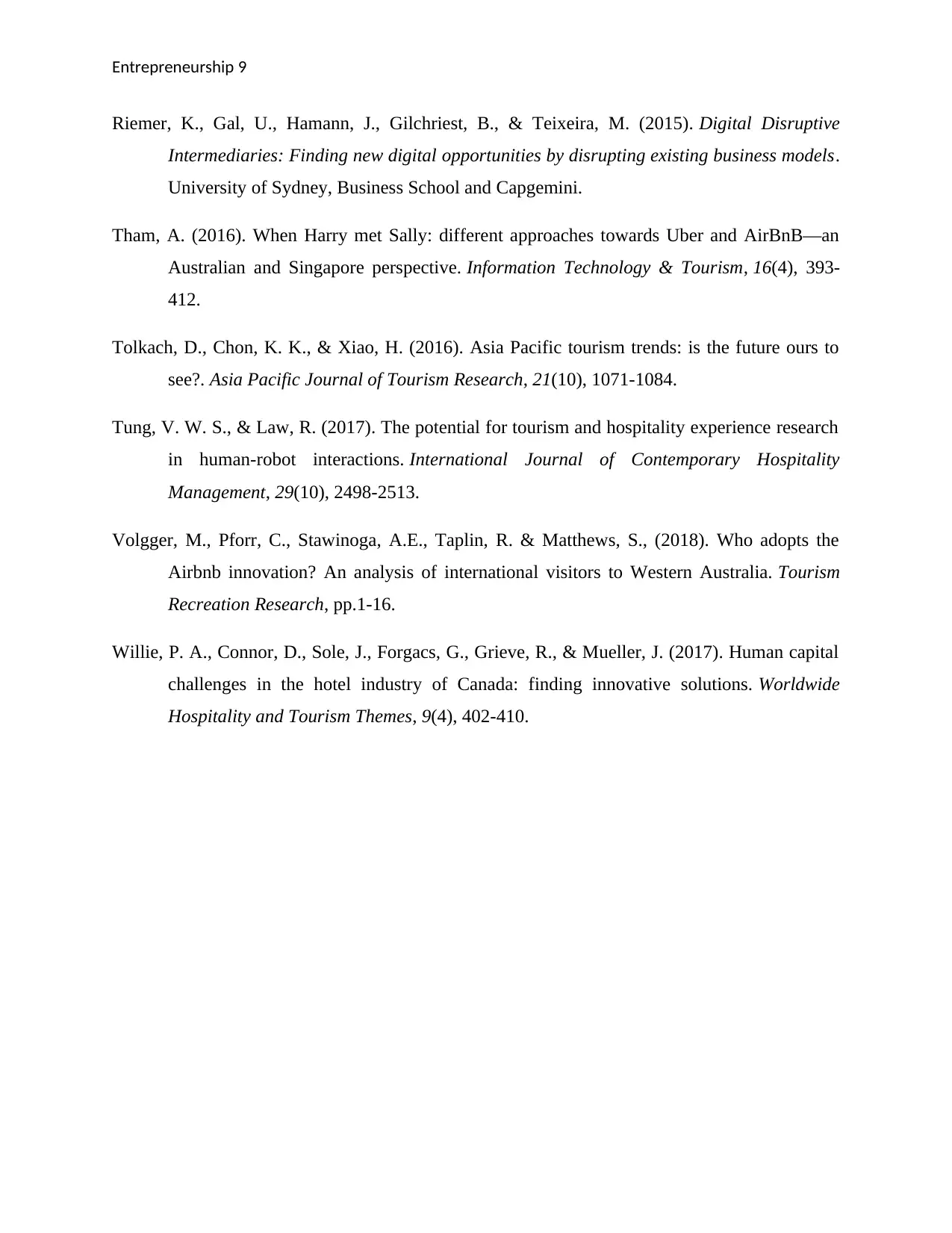
Entrepreneurship 9
Riemer, K., Gal, U., Hamann, J., Gilchriest, B., & Teixeira, M. (2015). Digital Disruptive
Intermediaries: Finding new digital opportunities by disrupting existing business models.
University of Sydney, Business School and Capgemini.
Tham, A. (2016). When Harry met Sally: different approaches towards Uber and AirBnB—an
Australian and Singapore perspective. Information Technology & Tourism, 16(4), 393-
412.
Tolkach, D., Chon, K. K., & Xiao, H. (2016). Asia Pacific tourism trends: is the future ours to
see?. Asia Pacific Journal of Tourism Research, 21(10), 1071-1084.
Tung, V. W. S., & Law, R. (2017). The potential for tourism and hospitality experience research
in human-robot interactions. International Journal of Contemporary Hospitality
Management, 29(10), 2498-2513.
Volgger, M., Pforr, C., Stawinoga, A.E., Taplin, R. & Matthews, S., (2018). Who adopts the
Airbnb innovation? An analysis of international visitors to Western Australia. Tourism
Recreation Research, pp.1-16.
Willie, P. A., Connor, D., Sole, J., Forgacs, G., Grieve, R., & Mueller, J. (2017). Human capital
challenges in the hotel industry of Canada: finding innovative solutions. Worldwide
Hospitality and Tourism Themes, 9(4), 402-410.
Riemer, K., Gal, U., Hamann, J., Gilchriest, B., & Teixeira, M. (2015). Digital Disruptive
Intermediaries: Finding new digital opportunities by disrupting existing business models.
University of Sydney, Business School and Capgemini.
Tham, A. (2016). When Harry met Sally: different approaches towards Uber and AirBnB—an
Australian and Singapore perspective. Information Technology & Tourism, 16(4), 393-
412.
Tolkach, D., Chon, K. K., & Xiao, H. (2016). Asia Pacific tourism trends: is the future ours to
see?. Asia Pacific Journal of Tourism Research, 21(10), 1071-1084.
Tung, V. W. S., & Law, R. (2017). The potential for tourism and hospitality experience research
in human-robot interactions. International Journal of Contemporary Hospitality
Management, 29(10), 2498-2513.
Volgger, M., Pforr, C., Stawinoga, A.E., Taplin, R. & Matthews, S., (2018). Who adopts the
Airbnb innovation? An analysis of international visitors to Western Australia. Tourism
Recreation Research, pp.1-16.
Willie, P. A., Connor, D., Sole, J., Forgacs, G., Grieve, R., & Mueller, J. (2017). Human capital
challenges in the hotel industry of Canada: finding innovative solutions. Worldwide
Hospitality and Tourism Themes, 9(4), 402-410.
1 out of 10
Related Documents
Your All-in-One AI-Powered Toolkit for Academic Success.
+13062052269
info@desklib.com
Available 24*7 on WhatsApp / Email
![[object Object]](/_next/static/media/star-bottom.7253800d.svg)
Unlock your academic potential
Copyright © 2020–2026 A2Z Services. All Rights Reserved. Developed and managed by ZUCOL.




